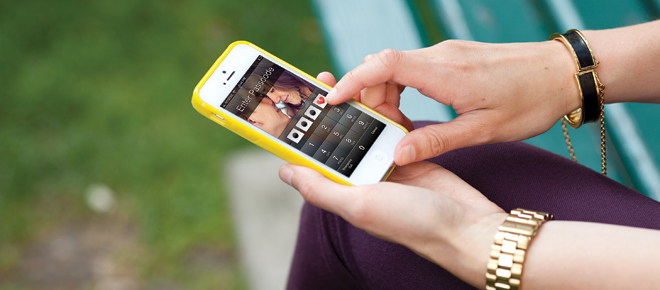Love is a four-number word
That magical password that unlocks your phone could seal a romance—or ruin it
Photo illustration by Sarah MacKinnon
Share

“We’re over,” an acquaintance said recently of her boyfriend of four months. “He gave me his password on our third date and then changed it and refused to give me the new one. Passwords and secrets do not belong in loving relationships. Transparency does.”
That old question, debated in certain circles, of how soon you go “all the way” has been replaced by a new one: when to share the password to your phone. Handing over those prized digits so your partner can see your texts, emails, photos and recent phone calls—in other words, your entire social existence at a glance—is either romantic or creepy, depending on whom you ask.
Real estate lawyer Warren Fireman and his wife of 13 years share passwords. Often they lie in bed at the end of the day reading each other’s phones. “I just look to see what was going on in her day and she does the same. She has a huge family and so do I, so there is always something going on. We like to be kept in the loop.” Singer Carrie Underwood once said in an interview that she does the same with her hockey-player husband’s phone after she’s been on the road. As Fireman puts it, “We’re happily married. We have nothing to hide.”
But many women, hurt in past relationships, may want the password sooner rather than later, says Sara Fawkes, a counsellor based in Toronto. It’s often an ongoing negotiation, she says. “Some people are just very secretive. You need to figure out what the motivation is for asking.”
More transparency is not always better. A Calgary-based art dealer says she’s no longer allowed to look at her husband’s phone after having his passwords for a decade. “We were getting into too many fights. I would read something I didn’t like, and he’d argue that I didn’t know the context, and that caused fights.” She still has qualms. “When you share a house and a family but not your password, it seems like you have something to hide,” she says. But she admits she is much happier now. “I can’t see stuff I may not like. We don’t fight nearly as much.” Another woman got her partner’s password after a month of dating—“because I was always snooping anyway. I’d see him signing off with an ‘xo’ to someone and I’d get freaked out. I was questioning everything. I learned that he signed off ‘xo’ to everyone. That was just him. I do sometimes wish I didn’t have [the password],” she confesses.
Michael, a 42-year-old accountant, has been dating a woman for a month. He says he’d never give her his password. “If she asked me on our third or fourth or even 10th date, I would find it aggressive. You need some boundaries.” Once, he let her look at his phone and she saw he had looked at a dating site. “I didn’t join or anything. But the questions came fast and furiously.”
Password sharing can be about a kind of affectionate voyeurism more than suspicion. Many women say that if they see their partner’s or date’s phone and know the password, they’ll look, mostly because they are bored. Allan Cameron, a clinical social worker and therapist, is interested in the symbolism of password sharing. “Perhaps it’s an example of oversharing. The idea that our partner’s every thought, thread or Google search is of value and something we need access to, is disconcerting,” he says. “This privileging of the mundane yields little to the real task of developing a full and authentic relationship.” But he also sees password sharing as an attempt to speed up the formation of trust, which used to be painstakingly earned.
As with most things, once it’s given, it’s hard to take back. “A person may go with the demand to share their password but feel they are too exposed or have moved too quickly. They may rescind their password offer,” he suggests—which creates other tensions.
Toronto-based therapist Tammy Laber says one of the things she does with couples when there has been an affair is to suggest that they share passwords so the “wronged” spouse can regain trust. While the debate rages, Fireman has another thought. “Maybe instead of us lying in bed and looking at each other’s phones,” he jokes, “we should just talk more.”